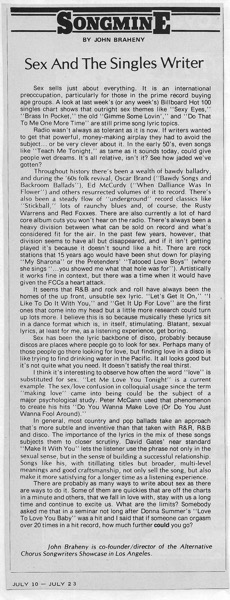A John Braheny Songmine column from the archives…

Accession Number: C000000137-033-001 Document/Digital File, “Songmine: Sex and the Singles Writer by John Braheny by John Braheny”, OCR converted text under same Accession Number
(Digitally converted text. Some errors may occur)
Sex And The Singles Writer
Sex sells just about everything. It is an international preoccupation, particularly for those in the prime record buying age groups. A look at last week’s (or any week’s) Billboard Hot 100 singles chart shows that outright sex themes like “Sexy Eyes,” “Brass In Pocket,” the old “Gimme Some Lovin’,” and “Do That To Me One More Time” are still prime song lyric topics.
Radio wasn’t always as tolerant as it is now. If writers wanted to get that powerful, money-making airplay they had to avoid the subject… or be very clever about it. In the early 50’s, even songs like “Teach Me Tonight,” as tame as it sounds today, could give people wet dreams. It’s all relative, isn’t it? See how jaded we’ve gotten?
Throughout history there’s been a wealth of bawdy balladry, and during the ’60s folk revival, Oscar Brand (“Bawdy Songs and Backroom Ballads”), Ed McCurdy (“When Dalliance Was In Flower”) and others resurrected volumes of it to record. There’s also been a steady flow of “underground” record classics like “Stickball,” lots of raunchy blues and, of course, the Rusty Warrens and Red Foxxes. There are’also currently a lot of hard core album cuts you won’t hear on the radio. There’s always been a heavy division between what can be sold on record and what’s considered fit for the air. In the past few years, however, that division seems to have all but disappeared, and if it isn’t getting played it’s because it doesn’t sound like a hit. There are rock stations that 15 years ago would have been shut down for playing “My Sharona” or the Pretenders’ “Tatooed Love Boys” (where she sings “…you showed me what that hole was for”). Artistically it works fine in context, but there was a time when it would have given the FCCs a heart attack.
It seems that R&B and rock and roll have always been the homes of the up front, unsubtle sex lyric. “Let’s Get It On,” “I Like To Do It With You,” and “Get It Up For Love” are the first -ones that come into my head but a little more research could turn up lots more. I believe this is so because musically these lyrics sit in a dance format which is, in itself, stimulating. Blatant, sexual lyrics, at least for me, as a listening experience, get boring.
Sex has been the lyric backbone of disco, probably because discos are places where people go to look for sex. Perhaps many of those people go there looking for love, but finding love in a disco is like trying to find drinking water in the Pacific. It all looks good but it’s not quite what you need. It doesn’t satisfy the real thirst.
I think it’s interesting to observe how often the word “love” is substituted for sex. “Let Me Love You Tonight” is a current example. The sex/love confusion in colloquial usage since the term “making love” came into being could be the subject of a major psychological study. Peter McCann used that phenomenon to create his hits “Do You Wanna Make Love (Or Do You Just Wanna Fool Around).”
In general, most country and pop ballads take an approach that’s more subtle and inventive than that taken with R&R, R&B and disco. The importance of the lyrics in the mix of these songs subjects them to closer scrutiny. David Gates’ near standard “Make It With You” lets the listener use the phrase not only in the sexual sense, but in the sense of building a successful relationship. Songs like his, with titillating titles but broader, multi-level meanings and good craftsmanship, not only sell the song, but also make it more satisfying for a longer time as a listening experience.
There are probably as many ways to write about sex as there are ways to do it. Some of them are quickies that are off the charts in a minute and others, that we fall in love with, stay with us a long time and continue to excite us. What are the limits? Somebody asked me that in a seminar not long after Donna Summer’s “Love To Love You Baby” was a hit and I said that if someone can orgasm over 20 times in a hit record, how much further could you go?
John Braheny is co-founder/director of the Alternative Chorus Songwriters Showcase in Los Angeles.
JULY 10 — JULY 23
See all previous entries in the Songmine Series
About Songmine and Music Connection Magazine:
John Braheny met Eric Bettelli and Michael Dolan right before they were going to publish Music Connection magazine. Eric and Michael wanted to get their publication out to as many songwriters as they could. They had already heard of the LA Songwriters Showcase, and of John and his partner, Len Chandler. John’s goal was to advertise the schedule of guest speakers and performers at the weekly Showcase… so they made a deal.
They published John’s Songmine column (he had never before written a magazine article!) in their very first edition, in November 1977. Trading out the column for advertising, this arrangement continued for many years. Plus, Eric and Michael came to the Showcase each week and distributed free copies to the songwriters!
Those articles became so popular that (book agent and editor) Ronny Schiff offered John’s articles to F&W Media, where they became the backbone of John’s textbook, The Craft and Business of Songwriting. As a follow-up, Dan Kimpel (author, songwriter, teacher), who had also worked at LASS, took on the Songwriting column at Music Connection magazine which continues to this day! You can subscribe to get either hard copies or online.
No comments yet.